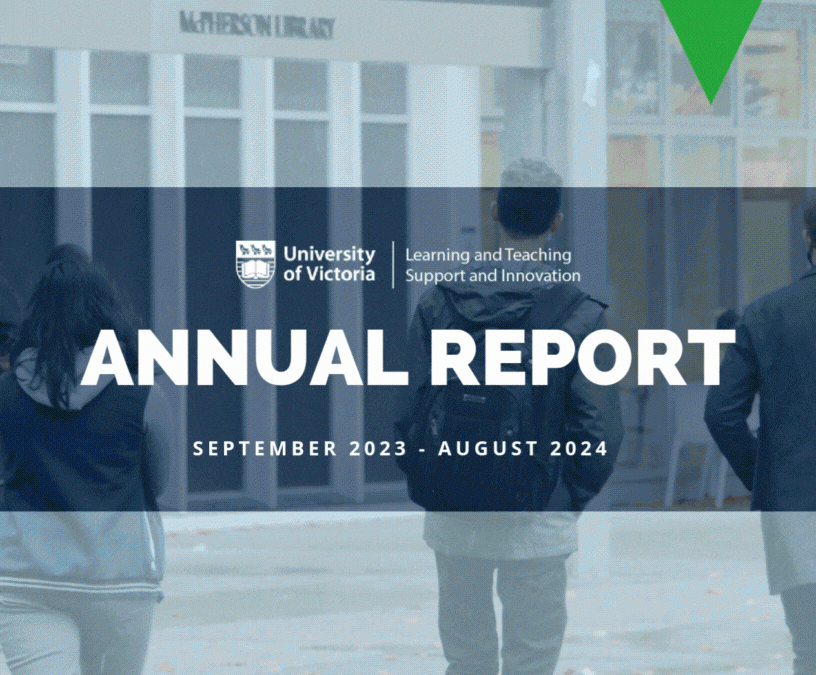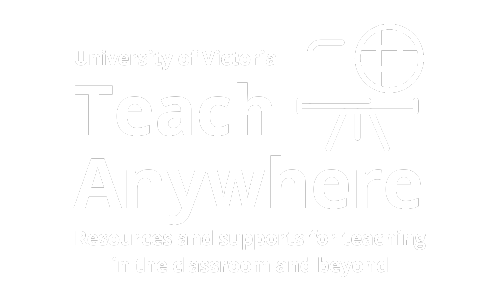Overview
In the 2021/2022 reporting cycle, the division of LTSI continued to gain visibility and credibility. The COVID-19 pandemic continued to provide a shift in learning and teaching modalities. We saw a return to in-person classes in Fall of 2021, we continued to navigate through complexity and an ever changing environment, managing increases in-person absences, the provisioning and launching new multi-access classrooms, a robust rollout of technology to support class recordings. Added to this context was an emergency shift to online exams to conclude the Fall term and the launch of the Winter 2022 term online for the first two weeks before returning in-person.
Throughout the ever-changing learning and teaching landscape over the past couple of year, the division has continued to respond to the uncertainty. We have committed to our goal in aligning with faculty/instructors to support pedagogically sound research-informed teaching practices, along with technology infused environments to enhance accessibility wherever possible and to focus on supporting student learning in all that we do.
In the 2020/2021 reporting year, LTSI grew in staffing, services, and resources we offer. We saw unprecedented growth with staffing including new term position, adding coop students, internal secondments to address the emergency teaching and learning needs of the university. These new positions and growth were made possible by the one-time COVID funding for 2020 and 2021. This past reporting cycle, 2021/2022 saw a resetting of our staffing levels and adjustments to address the shifts in the learning and teaching environment and reductions in funding as a result of the conclusion of COVID funding.
Also notable changes in our key staffing roles occurred in 2021/2022. Dr. Laurene Sheilds, Executive Director of LTSI, stepped down from her leadership role after six very successful years providing unshakable guidance and support to a new division emerging from an integration of the former Learning and Teaching Centre and Technology Integrated Learning to create LTSI. Dr. Sheilds stepped down on June 30th, 2022. The leadership role for LTSI transferred to Dr. Shailoo Bedi on July 1st, 2022. Added to this, we also saw Dr. Mariel Miller, Director, TIL move into a faculty position with Educational Psychology and Leadership Studies in March 2022.
Download the full report
Download this report in a PDF form for printing and viewing purposes.
At a Glance Highlights
Student Success
- Assisted students with online and hybrid supports within the Centre for Academic Communication, Math & Stats Assistance Centre and the Learning Strategies Program; including an increase in online appointments both through written feedback and zoom appointments and provided specific supports for Indigenous students.
- Opened the Betty & Gilbert Kennedy Math & Stats Assistance Centre (support funding by the Faculty of Science), in the Elliot Building.
- Developed the Valerie Kuehne Undergraduate Research Awards (VKURA) internship, which awarded 44 students from 7 faculties and 13 departments.
- Developed and completed two successful Students in Community programs (funded by CEWIL Canada) to enhance student learning, remunerate community for their contributions to student learning, and celebrate and share CEL collaborations and outcomes.
Teaching Support
- Guided instructors through changes in teaching modalities from online, to in-person and blended. This support included workshops, drop-ins and one-on-one support as well as teaching observations and faculty development.
- Introduced a new role: Learning Experience Designer – Accessibility (LED-A), to support instructors with accessibility requirements in their classroom and work alongside the Centre for Accessible Learning.
- Created a new Anti-Racism Initiative Grant (ARI), which awarded $63,350.24 to 10 recipients.
- Supported teaching assistants through the Learning and Teaching Together with Technology (L3T) program which included funding support from the VPAC’s office for up to five hours per new TA until January 2022.
Technology Enhancements
- Created resources and digital communications using Teach Anywhere: an OAC specific site for Faculty and Instructors, which included a term specific learning and teaching resource page to include important updates for in-the-moment learning and teaching supports.
- Worked alongside University Systems to launch the lecture capture and multi-access classroom projects to enable in-class recordings, live-streaming, and multi access modalities using a new video hosting platform: Echo360 (from Kaltura).
Looking Ahead
As we move into a new context of learning and teaching and a new academic year (2022-2023) the division will be focusing on the following deliverables:
- Addressing our staff issues and retention issues to ensure the best possible support to faculty and students
- Supporting faculty and instructors with more complex issues regarding pedagogy, such as trauma informed approaches, Indigenous ways of knowing and more inclusive and equitable teaching practices (informed by UNDRIP and DRIPA).
- Improving accessibility for learning and teaching that is inclusive and supportive of the new BC Accessibility Legislation
- Responding and addressing executive decision making from the new UVic strategic plan and all accompanying plans (e.g. updated Indigenous Plan, International Plan, etc.)
- Supporting and involvement in the creation of a new UVic Digital Strategy Initiative
- Launching a full assessment and usability study to inform redesign of Teach Anywhere and Learn Anywhere to ensure resources are meeting user needs
- Participating in a Division wide external review to help inform the development of a new LTSI strategic plan and goal setting
- Embedding more evidence based data in LTSI’s approaches and resources through Scholarship of Teaching Learning oriented research studies
- Maximizing internal capacity and stronger collaborations within the division through the implementation of a working group model for team projects
We are looking forward to working with our campus collaborators to continue our efforts in supporting the growing and changing learning and teaching needs of the university. We are excited about the potential to work together and to work towards innovation that is supportive of the emerging trends in higher education.
Shailoo Bedi
Executive Director
Division of Learning and Teaching Support and Innovation, University of Victoria
ltsied@uvic.ca
View previous reports

LTSI Annual Report: 2023 to 2024
About This year’s LTSI 2023-2024 Annual Report highlights our commitment to fostering innovation, collaboration, and inclusivity in teaching and learning. From launching new initiatives like the UVicLearn website and Academic Integrity 101 module to advancing accessibility and leveraging data-driven insights, we’ve made significant strides in supporting students, faculty, and staff while laying the foundation for future growth. LTSI by numbers Our three themes Going forward Previous reports...
LTSI Annual Report 2022 to 2023
Over the past year, the Division of Learning and Teaching Support and Innovation has undergone a transformative phase, marking its first full year under new leadership and contending with significant organizational changes, including University wide budget reductions. Our purpose throughout the year remained constant —to prioritize students’ learning journeys and growth by fostering a culture of exceptional teaching and innovation that promotes academic success and personal development.
LTSI Annual Report: 2020 to 2021
Winter Session 2020/2021 was as fast-paced as the 2019/2020 academic year within the Division of Learning and Teaching Support and Innovation (LTSI). With the arrival of COVID-19 in March 2020, LTSI played a central role in supporting the shift to emergency remote teaching for the completion of Spring and Summer term 2020. LTSI was then responsible for supporting a predominantly online environment for the Winter Session 2020-21 & Summer Term 2021. Fall 2021 brought the return to a pre-dominantly in-person environment where LTSI once again focused on the necessary supports required in the on-campus learning environment.
